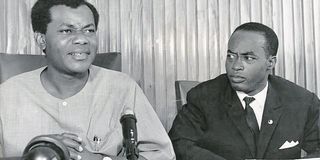The rise and fall of Oscar Kambona – 1

Oscar Salathiel Kambona (left). One of Julius Nyerere’s closest allies and most influential politician of his time, the vocal and ambitious Kambona worked tirelessly as a government minister and secretary general of the ruling party Tanu. PHOTO I AGENCIES
What you need to know:
The rise and fall of Oscar Salathiel Kambona provides a powerful example of the perils of politics in Africa, particularly in the tumultuous period of independence struggle and first years of post-independence era
Oscar Salathiel Kambona boarded East African Airways flight 720 in Nairobi, Kenya in the evening of July 26, 1967 for Europe. He had reached a point of no return. Earlier that day, Kambona, his wife, children, and house attendant drove from Dar es Salaam secretly and slipped through the border into Kenya. It was a scene that could have come out of a James Bond movie.
Kambona had made advanced arrangements to fly out of the country sometime between July 25 and 27th; this was probably a ploy to distract officials. He was under close surveillance and an order was issued to prevent him from leaving the airport. Kambona made the decision to escape from Tanzania in the course of 1967.
He had watched his grip on power and influence slip away over the course of two years. Kambona reached the pinnacle of power during the army mutiny in 1964; he helped build up Tanu, fight for independence, and shape new government institutions after independence. However, change of events compelled him to tender his resignation as the Secretary General of Tanu and Minister for Local Government and Rural Development on June 9, 1967 at the age of 39.
He cited ill health as the reason for the resignation at the time. Many continue to blame ideological differences, particularly over the Arusha Declaration and Nyerere’s tightening grip on power as the main reasons for Kambona’s disillusionment and fall from political grace.
There is evidence that suggests the picture was much more complex; a combination of political ambitions, struggles between factions vying for power, missteps that led to diplomatic crises, and evolving ideological differences, ultimately converged to shape Kambona’s demise.
The rise and fall of Kambona provides a powerful example of the perils of politics in Africa, particularly in the tumultuous period of independence struggle and first years of post-independence era.
Kambona was born on August 13, 1928 in southern Tanganyika. He was destined to glory. Kambona was a studious young boy who excelled in English and other subjects. His academic performance guaranteed a seat among some of Tanganyika’s most promising students in the prestigious Tabora Boys’ Government school.
At Tabora, Kambona mingled with some of Tanzania’s future leaders including, Emilio Charles Mzena, Albert Nyirenda, Job Lusinde, and Julius Nyerere who was then a teacher in another school. He developed close friendships with some of his school mates in Tabora; one of them was the future Foreign Minister of Malawi, M.W. Kanyama Chiume, with whom they would become teachers at Alliance Secondary School in Dodoma.
Political agitation
Conscious of the oppressive nature of British colonial rule and determined to fight for independence, Kambona joined the Tanu and became vocal about his views. He could not refrain from political agitation even while employed by the colonial government. Kambona was involved in a student strike that led to his resignation as a teacher before going into politics full time.
Kambona and his friend Chiume resigned from their positions as teachers in Dodoma around the same time. Kambona would later claim he resigned in order to work for Tanu to increase membership of the party and he did it without pay.
Kambona became the Secretary General of Tanu in 1955. He would work tirelessly in the course of 1955 and 56 to increase Tanu membership, travelling to different corners of Tanganyika. Kambona’s role in helping to increase Tanu membership cannot be overlooked. It is reported that Kambona helped recruit over 10,000 members within a period of six months and over 100,000 in one year.
Kambona was vocal and ambitious. As far back as early 1955, he challenged Nyerere on the decision to invite an interracial group of leaders for a conference to discuss UN visiting mission report. The two would work closely to organise the party and attract more supporters. Kambona travelled with Nyerere to try and convince Mangi Mkuu, Thomas Marealle, about the merits of Tanu policies during one tour of the Northern Province in 1955.
An opportunity came in 1957 for Kambona to go study in Britain. There he met and became friends with people from different places. One of the people he was in contact with was the Pan Africanist George Padmore, a close friend of Kwame Nkrumah. Kambona became a roommate of Kassim Hanga from Zanzibar in London; it was the beginning of a long friendship and the two would eventually leave their mark on Zanzibar and mainland Tanzania.
Kambona continued to do party work in Britain and was very active politically; he became the head of Tanu branch in London. Kambona became the first to broadcast on the BBC Kiswahili Service on June 27, 1957. Kambona was heard on the radio that day saying: “This is London.
Today for the first time ever, BBC London sends greetings to all the residents of East Africa, in their own language. Asalaam Aleikum.” Kambona could be heard through BBC in Tanganyika, Kenya, Uganda, Rwanda and Burundi, and Congo.
British mistreating him
Ghana organised the important All African People’s Conference in 1958. George Padmore was the one who convinced Kambona to attend the conference. Kambona was able to travel to Accra in 1958 to attend the conference. Back in Britain, his experiences with the British were not always positive. At times Kambona felt that the British were mistreating him.
He met and fell in love with a young woman from Tanganyika, Flora Moriyo. The relationship became serious by the end of 1959 and plans were made for a wedding.
As for school, Kambona completed his studies, but did not pass the bar exam to become certified attorney. His heart and mind was back home during his stay in Britain.
Nyerere went to Britain on a “vacation” between June 26th and August 7, 1959; he stayed with Oscar Kambona. Publicly the trip was supposed to be a “vacation,” but Nyerere was very busy in London. Kambona was in close contact with his old friend from Tabora Boys Chiume who was also in London at the time; the two helped establish some contacts for Nyerere while he was there.
Nyerere gave a key speech at a meeting that led to the establishment of the British Anti-Apartheid Movement. The main reason for the trip, however, was to campaign for an agreement for Internal Self government in Tanganyika.
Tanu was demanding elections and Internal Self-Government at the time and threatened to launch protest if their demands were not met.
Kambona and Nyerere spent hours discussing politics and what to do next. They were particularly concerned at the time with the British plans for the constitutional reforms, elections, and upcoming Tanu conference.
Kambona was anxious to return home to continue with the struggle for independence. Kambona would provide details of the events of 1959 at a press conference in London in 1991; he asserted that he managed to convince Nyerere to return to Tanganyika and make a statement to the press that white settlers in East Africa were reasonable.
He claimed further that Nyerere convinced him to end his studies and return to Tanganyika to help him make a case within Tanu and in the territory for a different approach to the struggle. Kambona returned to Tanganyika in October and went on a tour to prepare for the November Tanu National Conference.
International attention
Kambona and Nyerere had grown close in the course of 1959. Nyerere went back to Britain in November 1960 to attend Kambona’s wedding. Nyerere gave away the bride at the wedding. He was then based in Tanganyika and was serving as a Minister. Kambona married Flora Moriyo at St Paul’s Cathedral in London. It was a grand wedding with over 400 guests in attendance.
The wedding received international attention and was published in newspapers and magazines around the world. This was the first time for a black couple to marry at St Paul’s Cathedral.
Tanu won a major victory in the elections of August 1960; they won 70 out of the 71 elected seats. Kambona had developed into one of Tanu’s spokesman in the months leading up to the elections. He made numerous important policy announcements in 1960 in the months leading up to the elections.
Kambona outlined Tanu policy in a major policy statement in January 1960 while talking to a large crowd. He told the audience that the party would push for Socialist policies. Socialist programme was, therefore, in Kambona’s mind as far back as early 1960.
He added in the same speech that the party was interested in “private enterprise.” Kambona would be linked to Communist contacts in Dar es Salaam and become an admirer of Kwame Nkrumah in the second half of the 1960s.
Tanganyika won internal self-government with Tanu in power. The party was positioned to take over power after independence. Kambona became the Minister for Education in September of 1960.
Events moved fast in the period between September 1960 and December 1961. Tanu was preparing to take over the government after independence. Kambona worked tirelessly as a government Minister and Secretary-General of the party. There were discussions about which model of democracy to follow after independence.
Opposition parties
Many African countries adopted the Westminster representative model. Some leaders in Tanganyika were concerned that multiparty system would impede development as far back as 1961. Kambona was involved in the many discussions about what to do with opposition parties once the country became independent. He would play an important role in stifling the opposition side.
Talking to delegates of the All African Peoples’ Conference in early 1961 in Tanganyika, Kambona told the audience that political parties that menace the well being of Tanganyika would “suffer consequences.” He went on to say that Tanu struggled for seven years for freedom while others did nothing.
“We shall not tolerate defamation any longer; it they do not believe us, let them go ahead with what they are doing.”
This was a direct threat to leaders of the opposition parties who were planning to challenge Tanu. The feeling among many Tanu leaders was that they led a powerful and successful movement against the British colonial rule and were not about to let few opposition leaders challenge them.
On the other hand, some feared that opposition could be used as a tool by former colonialists or other foreign powers to subvert the country. Events in Congo still loomed high in their minds.
Professor Azaria Mbughuni is Chair, History Department, Lane College, US. He can be contacted on: Email - [email protected]; and Twitter - @AzariaTZ




